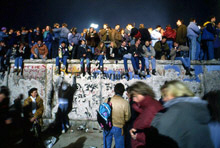
Typical street scene in Santa Ana, El Salvador. (Photo: iStock)
IMF Survey: New Book Weighs IMF Response to a Crisis-Filled Decade
March 21, 2012
- Events of the 1990s transformed IMF’s role
- Globalization, transparency were game-changers
- Decade's history holds valuable lessons for the institution
The 1990s was a tumultuous period, not just for the IMF, but also globally.

James Boughton’s work explores how barriers on many levels came down during the 1990s, beginning with the fall of the Berlin Wall in 1989 (ZUMA Press/Newscom)
IMF History
Following the fall of the Berlin Wall, the world witnessed the collapse of the Soviet Union and the difficult transition of former Eastern bloc countries to market economies. Beginning with Mexico in 1994, a series of crippling financial crises spread across the globe. China, India, and many other countries took giant steps out of poverty, while others struggled to keep up.
For the IMF, these events presented challenges that took the international financial institution into uncharted territory and transformed its role.
The latest volume of the IMF’s official history, Tearing Down Walls: The International Monetary Fund, 1990-1999, provides a unique, insightful look at how the institution responded to the events of that decade.
From secrecy to openness
Basing his account on a wide range of interviews, documents from the IMF’s archives, and scholarly research, IMF historian James Boughton analyzes the inner workings of the institution during the 1990s in the context of political, social, and intellectual developments of the world at large.
The title Tearing Down Walls refers to the destruction of barriers at many levels—the fall of the Berlin Wall and all that it symbolized; the process of globalization in which economic and financial walls between countries disappeared; and the IMF’s own effort to become more transparent and remove barriers that had made it seem mysterious to much of the world.
The IMF’s cultural shift from secrecy to openness is a key theme of the book. Boughton describes the rapid unfolding of the Mexican crisis in 1994 and how IMF economists realized they did not have enough data in real time to keep pace with what was happening. This realization led to some soul-searching at the IMF, and ultimately resulted in greater transparency on the part of both the institution and its member countries.
The book contains many other vivid descriptions of what went on behind the scenes as IMF mission teams worked with governments to stave off financial collapse in Asia, Russia, and elsewhere. Boughton’s detailed account of crisis resolution efforts in Indonesia, Korea, and Thailand is particularly dramatic. Besides being compelling reading, the successes and failures recounted in this history serve as valuable lessons for the future, IMF Managing Director Christine Lagarde suggests in the foreword.
Expanded Fund role
Boughton’s book—the fifth in a series of IMF histories—also explains how events drew the IMF into new and expanded roles. Among these were helping centrally planned economies manage the transition to market economies, coming to the aid of countries in financial crisis after the sudden loss of support from private financial markets, adapting surveillance to reflect the growing acceptance of international standards for economic and financial policies, helping low-income countries grow and alleviate poverty, and providing adequate financial assistance to members in an age of limited official resources.
Throughout the book, Boughton analyzes the internal struggles at the IMF between the demand for these expanding roles and the desire to stay within the Fund’s mandate as a monetary institution.
Boughton, who was named Historian of the IMF in 1992, also served on the institution’s staff from 1981 to 2010. He holds a Ph.D. in economics from Duke University and authored the previous volume of the IMF’s history, Silent Revolution: The International Monetary Fund, 1979-1989.


